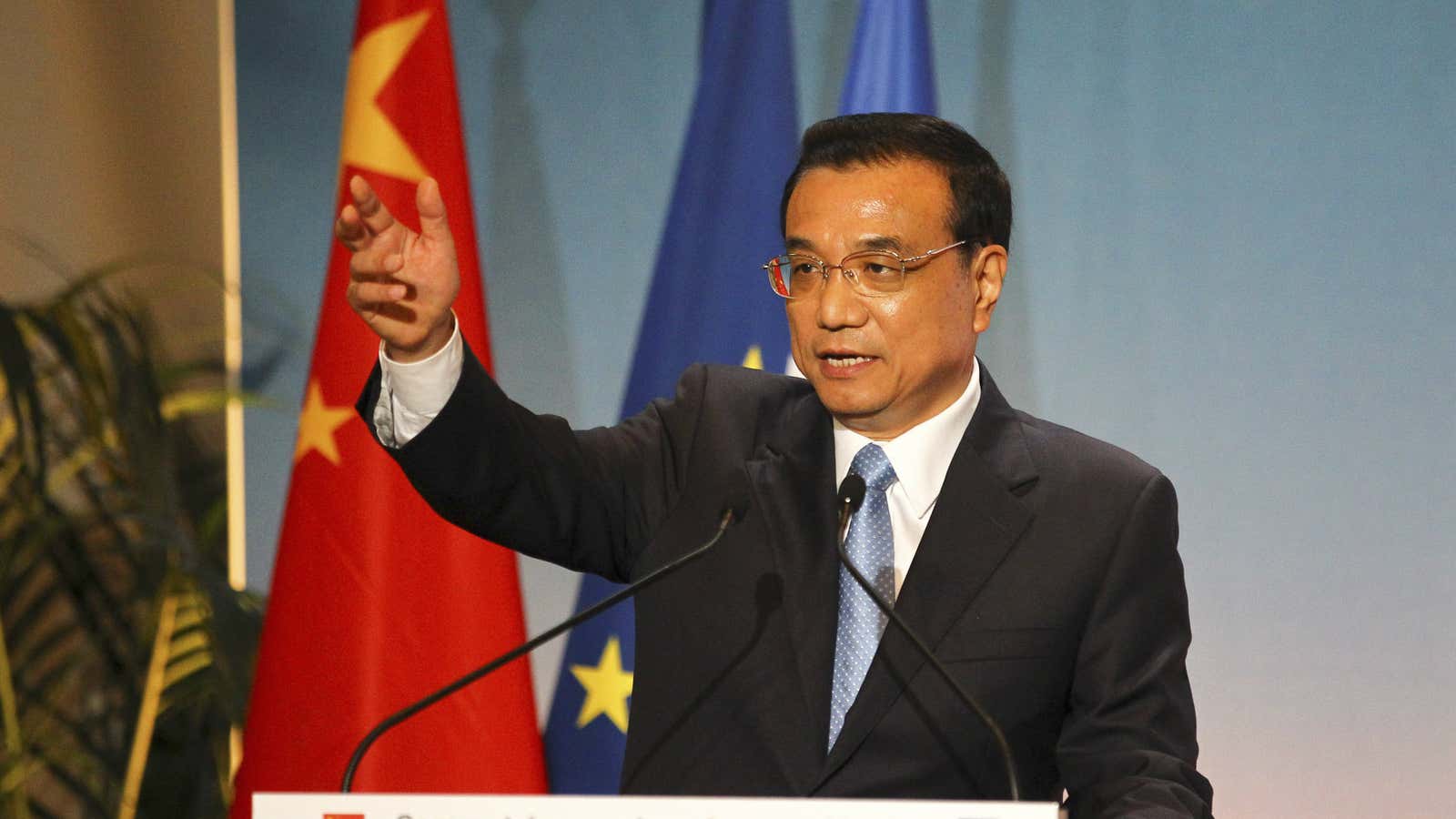This past weekend, China’s State Council, a central governing body led by premier Li Keqiang, released a detailed outline of Internet Plus, an ambitious plan to boost the economy by promoting new web-based businesses (link in Chinese).
But the plan is being promoted at an awkward time for Li—after all, as the government’s intervention in China’s stock markets shows, that support and encouragement is mostly theoretical right now. Stocks of massive state-owned enterprises were stabilized on Monday by billions of dollars in governments stimulus, while private tech and internet companies have watched their stock prices continue to plummet.
On Monday’s close, the Shanghai Composite was up 2.4 percent after shares in PetroChina, ICBC, Agricultural Bank of China, Bank of China, and other SOEs rose more than 8 percent during Monday’s trading.
But ChiNext, the NASDAQ-style board of the Shenzhen Stock Exchange created to attract small-cap technology firms, has continued to slide despite the stimulus, and was down over 4 percent Monday.
The CSI China Internet ETF, a Nasdaq-listed fund of Chinese internet stocks, has fallen steadily since its mid-June peak, and dropped another 7% on Monday. Even Huawei Techologies, the giant network equipment company, closed down 8.78% in Shenzhen on Monday.
Of course, when any government decides it is time for a financial bailout, it will look at the country’s biggest, most influential firms, which are often banking or oil. And there’s plenty of reason to believe that China’s tech stocks were overvalued to begin with—perhaps due to undue investor enthusiasm for Internet Plus.
But China’s steep and unchecked drops in internet stocks threaten to undermine confidence in the entire growing internet and tech industry itself. Because China’s state banks are notoriously tight-fisted when it comes to lending to new businesses, start-up tech and internet firms have mostly grown thanks to a mix of venture capital, willing equity investors, and other private funding.
China’s fund managers and brokers recently pledged to support the stock market as well—but they’re not supporting private internet and tech companies, and stock prices are falling as a result.
A retail investor who gets burned on China’s tech and internet companies isn’t likely to buy into the sector any time in the near future. A global venture capital fund who sees China’s state-owned enterprises will be bailed out at the expense of tech and the internet may decide to focus on other high-growth markets like Southeast Asia or Latin America in the short term.
China-focused investors in these stocks believe they will still be rewarded in the long-term. “Internet Plus has not been fully rolled out in the policy sphere and should be a gradual process over the next five years,” Ken Xu, partner at Gobi Partners, a venture capital firm based in Beijing, told Quartz on July 6. “As tech companies take on a more prominent position in the economy, policies will begin catering more to their benefit.” Still, he said, “for the immediate term, SOEs are still an integral part of the economy and depend on government support.”
Li has far-reaching ambitions for China’s internet expansion, as the State Council paper shows. It singled out eleven industries vital to the Chinese economy that the internet could boost: entrepreneurship, manufacturing, agriculture, energy, banking, healthcare, education, logistics, e-commerce, transportation, and the environment.
The paper highlighted internet-based loans, insurance, and securities from private companies, online education services and online medical record-keeping. It also said the internet can improve the the quality of transportation, which should give ride-sharing companies like Uber or Didi Kuadi a reason to feel optimistic about their future in China.
But many of these sectors have traditionally been served by state-owned enterprises, making it difficult to see how sustainable this support support for private internet business is. Already Ant Financial, an Alibaba spin-off, competes with state-owned banks like ICBC and the China Construction bank to offer loans and funds for the nation’s consumers. The entry of more internet banks threatens to erode China’s state banks’ falling profits even further.
It’s easy for China’s central government to talk about embracing the disruption that the growth of a tech and internet economy bring. But following through is going to be more difficult.
